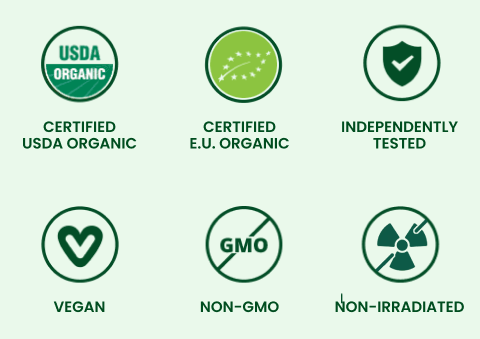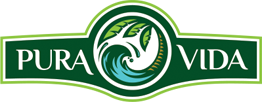Dr. Oz asked America what their #1 health concern was and the overwhelming majority of Americans responded with LOW ENERGY levels.
So Dr. Oz recently dedicated an entire episode to Solve the Energy Crisis in America.
The reason you're always exhausted? One word: MAGNESIUM
3 out of 4 Americans are not getting enough Magnesium in their diet -- we are Magnesium deficient!
This causes irritability, headaches, anxiousness and most of all fatigue.
So why are we talking about it here on MoringaPowder.com?
Because Moringa Powder is LOADED with Magnesium!
Simply adding 2 tablespoons of Moringa Powder to your daily diet will provide 37% of your daily Magnesium needs.
Moringa is also very high in Vitamin B and Calcium which helps with the absorption of Magnesium.
In short, Moringa is the #1 Natural Food source for fighting Magnesium Deficiency and restoring your energy levels!
So chalk this up as yet another scientifically verified benefit of Moringa Oleifera - The Miracle Tree.
Additional Insights on Moringa and Magnesium
Moringa, often referred to as the "miracle tree," is celebrated not only for its versatility in culinary uses but also for its impressive nutritional profile. One of its standout attributes is its high magnesium content. Magnesium is an essential mineral that plays a pivotal role in numerous bodily functions, from muscle and nerve function to blood glucose control and blood pressure regulation. With increasing numbers of people facing magnesium deficiency due to dietary restrictions or lifestyle choices, integrating moringa powder into your daily routine can be a simple yet effective way to boost your magnesium levels naturally.
The Role of Magnesium in Health
Magnesium is crucial for over 300 biochemical reactions in the body. It helps maintain normal muscle and nerve function, supports a healthy immune system, regulates heart rhythm, and assists in the formation of bones and teeth. Furthermore, magnesium is involved in the synthesis of protein, the regulation of blood sugar levels, and the production of energy. A deficiency in magnesium can lead to symptoms such as muscle cramps, fatigue, mental disorders, and even heart disease.
Many individuals do not get enough magnesium from their diet, especially those who consume processed foods or who follow restrictive diets. This is where Moringa comes in as a natural supplement. By adding moringa powder to smoothies, soups, or baked goods, you can effortlessly increase your magnesium intake while also benefiting from other essential nutrients found in Moringa, such as iron, calcium, and vitamins A, C, and E.
Exploring Moringa Capsules
For those who prefer a more convenient option, moringa capsules are an excellent alternative. They provide the same nutritional benefits as the powdered form but in a more accessible format, making it easy to ensure you meet your daily magnesium requirements without the need for cooking or preparation. Capsules can be particularly beneficial for individuals who are always on the go or for those who may not enjoy the taste of moringa powder.
In addition to magnesium, moringa capsules can help support overall health. They are rich in antioxidants, which help protect the body from oxidative stress and inflammation. Regular consumption of these capsules can contribute to better health outcomes, particularly for those with magnesium deficiency.
The Benefits of Moringa Oil
Another beneficial product derived from the Moringa tree is moringa oil, extracted from the seeds. This oil is renowned for its moisturizing and nourishing properties, making it a popular choice in skincare. Moringa oil is rich in oleic acid, which can help hydrate and protect the skin and is often used in cosmetic formulations to promote healthy skin and hair.
Moreover, the oil possesses anti-inflammatory and antimicrobial properties, making it an excellent choice for those looking to soothe irritated skin or combat acne. When combined with a healthy diet rich in magnesium, incorporating moringa oil into your skincare routine can enhance your overall well-being and appearance.
Moringa Extract: A Potent Option
For those looking to maximize the benefits of Moringa, moringa extract is another potent option. This concentrated form of Moringa allows for a smaller dosage while still delivering significant health benefits. Moringa extract is particularly appealing for individuals who are seeking to boost their nutrient intake without having to consume large quantities of the raw plant.
In addition to magnesium, moringa extract is rich in antioxidants, vitamins, and minerals, making it a holistic choice for those focused on improving their overall health. It can be taken as a supplement or added to beverages for a nutrient boost.
Incorporating Moringa into Your Diet
Integrating Moringa into your daily routine can be simple and enjoyable. Here are a few ideas for incorporating moringa powder, capsules, oil, and extract into your diet and lifestyle:
Smoothies: Add a teaspoon of moringa powder to your morning smoothie for a nutritious start to your day. Combine it with fruits like bananas, spinach, and almond milk for a delicious and healthy drink.
Soups and Stews: Stir in moringa powder into soups or stews during the last few minutes of cooking. This adds a nutritional boost without altering the flavor significantly.
Baked Goods: Incorporate moringa powder into your baking recipes. You can add it to muffins, pancakes, or energy bars to enhance their nutrient profile.
Salad Dressings: Mix moringa powder into homemade salad dressings for a healthy twist. Combine it with olive oil, lemon juice, and herbs for a refreshing dressing.
Topical Use: Use moringa oil as a moisturizer or serum on your skin. It can be applied directly to the skin or blended with other oils for added benefits.
Addressing Magnesium Deficiency
If you suspect you may be magnesium deficient, it's essential to consult with a healthcare professional for proper diagnosis and guidance. They can recommend dietary changes or supplements tailored to your needs. Incorporating Moringa, with its rich magnesium content, could be a beneficial part of your strategy.
Suggested Reading
To explore more about the various health benefits of Moringa, check out these articles:
7 Ways Moringa Naturally Fights Off Asthma Allergies
Moringa for Breastfeeding Mothers: Increase Breast Milk with Moringa
Moringa for Eye Health: Studies Show Moringa Fights Cataract Development
Moringa for Preventing Alzheimer’s
Moringa Oleifera: 10x Vitamin A of Carrots
1. How does Moringa help with magnesium deficiency?
Moringa leaves are a rich source of magnesium, which is essential for numerous bodily functions, including muscle and nerve function, energy production, and bone health. Incorporating Moringa into your diet can help increase magnesium levels, making it an effective natural remedy for magnesium deficiency.
2. How much magnesium is found in Moringa powder?
Moringa powder contains approximately 30 mg of magnesium per 100 grams. This makes it a valuable source of this essential mineral, especially for individuals looking to enhance their magnesium intake naturally.
3. Can I rely solely on Moringa for my magnesium needs?
While Moringa is a great source of magnesium, it’s important to maintain a balanced diet that includes a variety of magnesium-rich foods, such as nuts, seeds, whole grains, and leafy greens. Moringa can be a helpful addition, but it shouldn’t be the only source of magnesium.
4. Are there any specific benefits of magnesium from Moringa compared to other sources?
Magnesium from Moringa comes with the added benefits of other nutrients, including vitamins, minerals, and antioxidants. This makes Moringa a more holistic choice compared to some isolated magnesium supplements, as it provides additional health benefits that support overall wellness.
5. How can I incorporate Moringa into my diet to increase magnesium intake?
You can add Moringa powder to smoothies, soups, and baked goods or take Moringa capsules as a convenient supplement. Using Moringa oil in cooking or salad dressings is another delicious way to boost magnesium levels.
6. Are there any risks associated with taking Moringa for magnesium supplementation?
Moringa is generally safe for most people; however, excessive consumption may lead to digestive discomfort. It's advisable to start with a small amount and monitor your body’s response. If you have any underlying health conditions or are pregnant, consult a healthcare professional before starting Moringa supplementation.
7. How does Moringa compare to other magnesium-rich foods?
Moringa is unique because it offers a concentrated source of magnesium along with other essential nutrients. While foods like spinach, nuts, and seeds are also good sources of magnesium, Moringa provides a convenient way to incorporate multiple nutrients into your diet without the need for extensive preparation.


